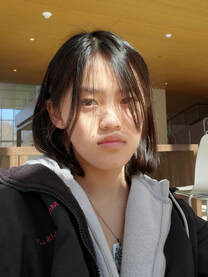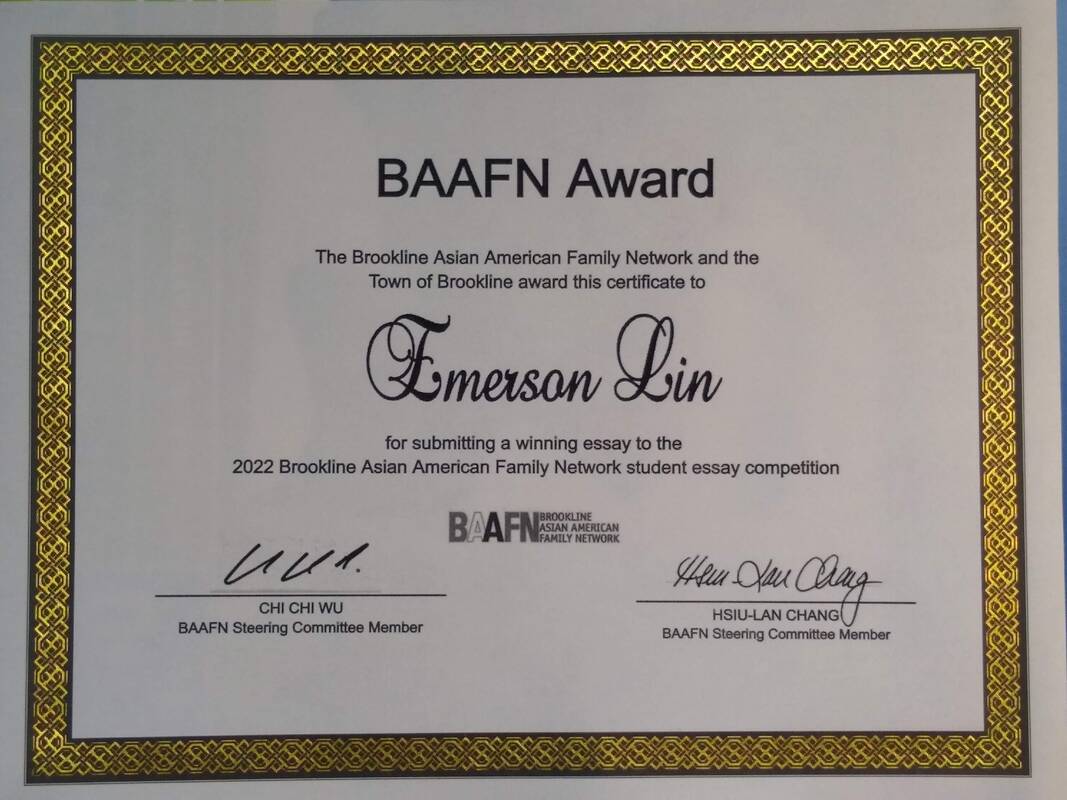2022 BAAFN Content Award
Memories of Summer
by Emerson Lin
Summers in Beijing are blazing. Sunlight boils off the sidewalk and seeps through my hair until the strands are sticky against my neck. The airport parking lot is a nightmare after a thirteen-hour flight; my legs are numb from disuse, and nausea still threatens to trickle up my throat. The temperature reads forty-one degrees on a screen beside a line of honking taxis, and the walk to our car feels endless.
But Beijing nights are filled with steady chatter and city lights, and the warm breeze carries smoke and nostalgia. Memories here nest in yogurt jars from street carts and the empty meeting rooms of my father’s office. They travel around the city in quiet subways and blue-striped yellow taxis before coming to rest in my father’s apartment. Eventually, the strangely familiar scents of the city lull me to sleep beneath the hum of the air conditioner.
Summers in Fujian are smothering. The air is humid and heavy, each day drowning in reminders of last night's rain. It pours every night for a week, and when it finally stops the mosquitoes venture out, marking my skin with countless tiny bites and eventually scars that take half a year to fade. This is my father’s hometown province; visits here are a welcoming but only occasional occurrence, and the years that stretch between them are a distance far greater than the ocean. I still feel like an intruder at times, a child from half the world away, barely able to speak. I still get scared that the words will twist as they cross my tongue, the language a half-stranger since I was thirteen.
Yet the night air by the nearby river is warm, and children laugh as paper lanterns float across the sky. My grandmother smiles when she hands me a freshly-steamed rice dumpling. As I sit in a living room crowded with faces familiar yet strange, my baby cousin, barely four months old, wraps her small fingers around my pinky. In these moments, all I feel is wonder.
Summers in America are a jumble.
In Mountain View, California, it was jelly sandals, plastic seesaws, and playgrounds where children would come to laugh and play, only to find that the metal bars burned too hot for their tender hands.
In Portland, Oregon, the memories are hazy, glimpses of shadows strung across dirt paths and slugs trailing after rain.
In Brighton, Massachusetts, it was the wide lawn that spread before our front door, picnics held right on the grass before the sidewalk, colored in with slices of strawberry shortcake.
And in Brookline, the memories are fond, filled with trips to convenience stores dragged out a little too long so as to avoid the heat waiting outside the sliding doors, before sitting and talking past sunset on wooden park benches.
My eighteen summers have been spent scattered over seven houses, six cities, and one village sitting up in the mountains. Each one has been its own season of discovery, wonder, and reconnection, and altogether they collect into a crucial part of who I am.
At times, I have wondered: What is it that defines me? Is it the number of words I can speak? My ability to read strokes on a page? Yet with every year and every summer that has passed me by, I’ve increasingly realized that it takes far more than just language to define such a huge part of my identity. Even if I were to lose the language altogether, that wouldn’t change the foods I find comfort in or the smile on my grandpa’s face. It wouldn’t make me forget the stories my dad told me about his childhood as we walked through the mountain village where he was raised. He spoke of the weight of his siblings, my aunts, then babies, on his back, as he worked beside his parents in the fields. I would still remember the bamboo forest and the roads that twist, from the aging archway crumbling paint over the entrance of the village down to the buildings crowded into the city far below.
This history, these experiences, are all things I carry, and become part of who I am. My father’s hard work has carried me to where I am now. Nights and conversations spent with my grandparents have raised me. As time passes, my memories will continue to collect and redefine who I am; while language is something I can reclaim, history is something I will never lose.
But Beijing nights are filled with steady chatter and city lights, and the warm breeze carries smoke and nostalgia. Memories here nest in yogurt jars from street carts and the empty meeting rooms of my father’s office. They travel around the city in quiet subways and blue-striped yellow taxis before coming to rest in my father’s apartment. Eventually, the strangely familiar scents of the city lull me to sleep beneath the hum of the air conditioner.
Summers in Fujian are smothering. The air is humid and heavy, each day drowning in reminders of last night's rain. It pours every night for a week, and when it finally stops the mosquitoes venture out, marking my skin with countless tiny bites and eventually scars that take half a year to fade. This is my father’s hometown province; visits here are a welcoming but only occasional occurrence, and the years that stretch between them are a distance far greater than the ocean. I still feel like an intruder at times, a child from half the world away, barely able to speak. I still get scared that the words will twist as they cross my tongue, the language a half-stranger since I was thirteen.
Yet the night air by the nearby river is warm, and children laugh as paper lanterns float across the sky. My grandmother smiles when she hands me a freshly-steamed rice dumpling. As I sit in a living room crowded with faces familiar yet strange, my baby cousin, barely four months old, wraps her small fingers around my pinky. In these moments, all I feel is wonder.
Summers in America are a jumble.
In Mountain View, California, it was jelly sandals, plastic seesaws, and playgrounds where children would come to laugh and play, only to find that the metal bars burned too hot for their tender hands.
In Portland, Oregon, the memories are hazy, glimpses of shadows strung across dirt paths and slugs trailing after rain.
In Brighton, Massachusetts, it was the wide lawn that spread before our front door, picnics held right on the grass before the sidewalk, colored in with slices of strawberry shortcake.
And in Brookline, the memories are fond, filled with trips to convenience stores dragged out a little too long so as to avoid the heat waiting outside the sliding doors, before sitting and talking past sunset on wooden park benches.
My eighteen summers have been spent scattered over seven houses, six cities, and one village sitting up in the mountains. Each one has been its own season of discovery, wonder, and reconnection, and altogether they collect into a crucial part of who I am.
At times, I have wondered: What is it that defines me? Is it the number of words I can speak? My ability to read strokes on a page? Yet with every year and every summer that has passed me by, I’ve increasingly realized that it takes far more than just language to define such a huge part of my identity. Even if I were to lose the language altogether, that wouldn’t change the foods I find comfort in or the smile on my grandpa’s face. It wouldn’t make me forget the stories my dad told me about his childhood as we walked through the mountain village where he was raised. He spoke of the weight of his siblings, my aunts, then babies, on his back, as he worked beside his parents in the fields. I would still remember the bamboo forest and the roads that twist, from the aging archway crumbling paint over the entrance of the village down to the buildings crowded into the city far below.
This history, these experiences, are all things I carry, and become part of who I am. My father’s hard work has carried me to where I am now. Nights and conversations spent with my grandparents have raised me. As time passes, my memories will continue to collect and redefine who I am; while language is something I can reclaim, history is something I will never lose.



